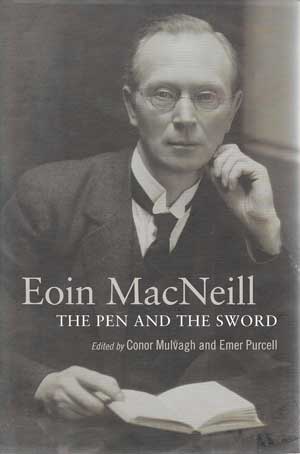EOIN MacNEILL: THE PEN AND THE SWORD
Published in Book Reviews, Book Reviews, Issue 5 (September/October 2022), Reviews, Volume 30CONOR MULVAGH and EMER PURCELL (eds.)
Cork University Press
€ 39
ISBN 978I782054603
Reviewed by Patrick Maume
Patrick Maume is a researcher with the Royal Irish Academy’s Dictionary of Irish Biography.
Eoin MacNeill is known above all for countermanding the original mobilisation orders for the 1916 Rising. For admirers of Pearse and the Rising leaders the professor was an ineffectual don out of his depth in war and politics. For MacNeill’s defenders—culminating in the 1980 biography by his son-in-law, Michael Tierney, and the 1973 essay collection The scholar revolutionary (edited by F.J. Byrne and F.X. Martin)—he was a much greater figure whose lifetime achievement was wilfully neglected. Scholars from a new and more detached generation now explore the voluminous MacNeill papers and other newly-available archives for new insights into the ‘scholar and man of action’.
MacNeill as a Celtic scholar (discussed by Dáibhí Ó Cróinín) challenged established myths and made inspired guesses based on profound linguistic expertise, deep knowledge of primary sources and an intuitive grasp of underlying structures. He formulated theories in notes and essays across many understudied areas, sacrificing a possible specialist magnum opus to develop a broader map, which later scholars could fill out. His dazzling scholarly contribution is traced by Ó Cróinín, Kevin Murray, Niamh Wycherley, and Elva Johnston, while his creation of the Irish Manuscripts Commission is charted by Michael Kennedy. These chapters also show how MacNeill’s scholarship related to religious and political commitments. The discrediter of the popularised historical framework derived from the Book of Invasions could engage in self-deceiving rationalisations in responding to works combining scholarship with unionist bias.
MacNeill has been called the Gaelic League’s necessary organiser and codifier, complementing Douglas Hyde’s inspirational leadership. MacNeill’s contribution to the language movement—including his 1891 essay ‘Why and how the Irish language is to be preserved’, editorships of the Gaelic Journal and An Claideamh Soluis, financial sacrifices, embroilment in Gaelic League factional disputes and the controversy over compulsory Irish for matriculation in the NUI—are explored by Liam MacMathúna, Regina Ui Chollatáin and Ruairí Cullen. Cullen’s analysis of MacNeill’s combination of deep Catholic commitment with willingness to criticise wrong-headed clerical interventions, also explored in Wycherley’s chapter on MacNeill and the early Irish Church, sets the scene for Carew’s discussion of how the first governments and administrators of the Irish state saw themselves facilitating an ‘Irish Cultural Republic’.
One of MacNeill’s regrets was that by supporting separatist politicisation of the Gaelic League he facilitated transformation of the cultural movement from self-sustaining initiative to dependence on the Irish state. Should MacNeill’s persistent belief in a minimal state as opposed to state-led developmentalism be seen as self-serving middle-class complacency? Did it reflect admiration for the cultural revival as grass-roots popular initiative in contrast to tax-eating Dublin Castle bureaucracy and the attempts of the Irish Parliamentary Party to subject civil society to its political discipline?
MacNeill’s denunciations of the unionist historical narrative of a state-led civilising process raise the question of how far state-building left blood on MacNeill’s own hands. Conor Mulvagh shows the deep mutual affection and political partnership between MacNeill and his wife Agnes and their eight surviving children (despite the death of their son Brian on the anti-Treaty side in the Civil War). This, and the ‘family perspective’ supplied by Michael McDowell, explains why MacNeill’s descendants remained devoted to his memory.
MacNeill’s chronic procrastination began with a breakdown caused by overwork, but also reflected an academic habit of a mind driven by incessant analysis and self-questioning (discussed by Mulvagh, Murray and Johnston) at its worst in Ted Hallett’s damning account of the Northern Ireland Boundary Commission. MacNeill, already despairing, drifted from acquiescence to acquiescence, finally ratifying the report with protests so faint that when he resigned his fellow-commissioners felt betrayed.
By crystallising his thoughts in memoranda or unsent letters, he sought to counter this indecision; once he decided on the correct course MacNeill forged ahead with inner self-assurance concealed by external passivity. When accepting the leadership of the nascent Irish Volunteers he consciously accepted possible imprisonment and death, shown in Michael Laffan’s chapter on MacNeill’s 1916-17 imprisonment and Mulvagh’s discussion of prison letters to his wife. In crisis MacNeill could move with surprising decisiveness, even ruthlessness; he was a revolutionary as well as scholar. This is visible in his actions on Holy Saturday 1916, the bluntness with which he justified recourse to arms before and after the Rising and, most disturbingly, the speed and clarity of his advocacy of reprisal executions during the Civil War. The extent to which in fragmentary subsequent recollections MacNeill sought to come to terms with these decisions is explored by Brian Hughes.
Shane Nagle’s chapter on Eoin MacNeill and nationalism is instructive in its exploration of MacNeill’s simultaneously incisive and self-deceiving attempts to define nationality. It would benefit from more attention to the formative political context, particularly in Ulster.
A comprehensive biography would require skills rarely combined in a single person, and years of scholarly commitment. This collection shows why Eoin MacNeill deserves such attention.

















